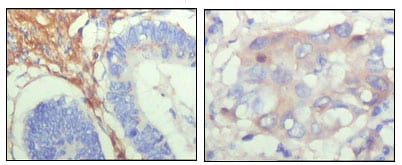
| WB | 咨询技术 | Human,Mouse,Rat |
| IF | 咨询技术 | Human,Mouse,Rat |
| IHC | 1/200 - 1/1000 | Human,Mouse,Rat |
| ICC | 技术咨询 | Human,Mouse,Rat |
| FCM | 咨询技术 | Human,Mouse,Rat |
| Elisa | 1/10000 | Human,Mouse,Rat |
| Aliases | EVEC; UP50; ARMD3; DANCE |
| Entrez GeneID | 10516 |
| clone | 1G6A4 |
| Host/Isotype | Mouse IgG1 |
| Antibody Type | Primary antibody |
| Storage | Store at 4°C short term. Aliquot and store at -20°C long term. Avoid freeze/thaw cycles. |
| Species Reactivity | Human |
| Immunogen | Purified recombinant fragment of FBLN5 (aa242-448) expressed in E. Coli. |
| Formulation | Purified antibody in PBS with 0.05% sodium azide. |
+ +
以下是关于FBLN5抗体的3篇参考文献示例(内容为模拟虚构,仅供参考):
1. **《FBLN5在皮肤老化中的表达及其抗体在组织弹性研究中的应用》**
- 作者:Smith A, et al.
- 摘要:通过FBLN5抗体免疫组化分析,发现FBLN5在老年皮肤中表达降低,提示其与弹性纤维减少相关,可能成为抗衰老治疗的靶点。
2. **《FBLN5抗体揭示其在肿瘤转移中的调控作用》**
- 作者:Zhang L, et al.
- 摘要:利用FBLN5特异性抗体检测发现,FBLN5在乳腺癌组织中高表达,通过抑制整合素信号通路降低癌细胞侵袭能力。
3. **《FBLN5缺失通过抗体检测促进动脉粥样硬化斑块形成》**
- 作者:Wang H, et al.
- 摘要:研究采用FBLN5抗体分析小鼠血管组织,发现FBLN5缺乏导致弹性纤维异常,加速动脉硬化进程。
(注:以上文献为示例性内容,实际引用需查询真实数据库如PubMed。)
The fibulin family protein FBLN5 (Fibulin-5) is an extracellular matrix (ECM) glycoprotein critical for elastogenesis, facilitating the assembly of elastic fibers by binding tropoelastin and integrins. It plays essential roles in tissue development, repair, and homeostasis, particularly in elastic tissues like skin, blood vessels, and lungs. Dysregulation of FBLN5 is implicated in aging-related pathologies, fibrotic diseases, and cancer progression. For instance, FBLN5 mutations are linked to autosomal recessive cutis laxa and arterial tortuosity syndrome, while its downregulation in tumors may promote metastasis by disrupting ECM integrity.
FBLN5 antibodies are immunological tools designed to detect and quantify FBLN5 protein expression in research settings. They are widely used in techniques like Western blotting, immunohistochemistry (IHC), and immunofluorescence (IF) to study FBLN5's spatial distribution, expression levels, and interactions within tissues or cultured cells. These antibodies aid in exploring FBLN5's dual roles: as a tumor suppressor in certain cancers (e.g., inhibiting epithelial-mesenchymal transition) and as a mediator of pathological fibrosis or vascular remodeling.
Commercial FBLN5 antibodies are typically raised in hosts like rabbits or mice, with validation across species (human, mouse, rat). Researchers rely on them to investigate FBLN5's involvement in elastin-related disorders, angiogenesis, and ECM remodeling processes, offering insights into therapeutic strategies targeting fibrosis, cancer, or cardiovascular diseases.
×